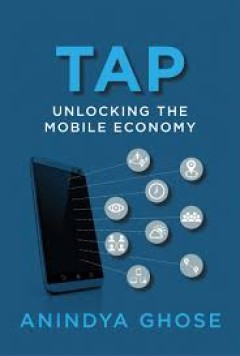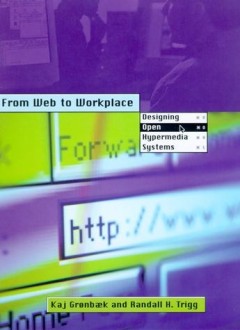Filter by

Tap :unlocking the mobile economy
"Consumers create a data trail by tapping their phones; businesses can tap into this trail to harness the power of the more than three trillion dollar mobile economy. According to Anindya Ghose, a global authority on the mobile economy, this two-way exchange can benefit both customers and businesses. In Tap, Ghose welcomes us to the mobile economy of smartphones, smarter companies, and value-se…
- Edition
- -
- ISBN/ISSN
- 9780262340427
- Collation
- 1 online resource (ix, 230 pages) :illustrations
- Series Title
- -
- Call Number
- -

From Web to Workplace: Designing Open Hypermedia Systems
In this book Kaj Gronbaek and Randall H. Trigg present a set of principles for the design of open hypermedia systems and provide concrete implications of these principles for issues ranging from data structures to architectures and system integration and for settings as diverse as the World Wide Web and the workplace.OCLC-licensed vendor bibliographic record.
- Edition
- -
- ISBN/ISSN
- 9780262274456
- Collation
- 1 online resource (xviii, 386 pages) :illustrations.
- Series Title
- -
- Call Number
- -

The archived web :doing history in the digital age
"How will the history of the present be written? As life continues to move online, the web becomes ever more important for an understanding of the past. This book offers an original theoretical framework for approaching the web of the past, both as a source and as an object of study in its own right"--OCLC-licensed vendor bibliographic record.
- Edition
- -
- ISBN/ISSN
- 9780262350112
- Collation
- 1 online resource (x, 185 pages)
- Series Title
- -
- Call Number
- -

Digital methods
In Digital Methods, Richard Rogers proposes a methodological outlook for social and cultural scholarly research on the Web that seeks to move Internet research beyond the study of online culture. It is not a toolkit for Internet research, or operating instructions for a software package; it deals with broader questions. How can we study social media to learn something about society rather than …
- Edition
- -
- ISBN/ISSN
- 9781461931867
- Collation
- 1 online resource (274 pages) :illustrations
- Series Title
- -
- Call Number
- -

The laws of the Web :patterns in the ecology of information
An accessible explanation of the hidden patterns found within the seemingly chaotic World Wide Web.Despite its haphazard growth, the Web hides powerful underlying regularities--from the organization of its links to the patterns found in its use by millions of users. Many of these regularities have been predicted on the basis of theoretical models based on a field of physics--statistical mechani…
- Edition
- -
- ISBN/ISSN
- 9780262275835
- Collation
- 1 online resource (x, 105 pages) :illustrations
- Series Title
- -
- Call Number
- -

Spinning the semantic Web :bringing the World Wide Web to its full potential
As the World Wide Web continues to expand, it becomes increasingly difficult for users to obtain information efficiently. Because most search engines read format languages such as HTML or SGML, search results reflect formatting tags more than actual page content, which is expressed in natural language. Spinning the Semantic Web describes an exciting new type of hierarchy and standardization tha…
- Edition
- -
- ISBN/ISSN
- 9780262256131
- Collation
- 1 online resource (xxiii, 479 pages) :illustrations
- Series Title
- -
- Call Number
- -
 Computer Science, Information & General Works
Computer Science, Information & General Works  Philosophy & Psychology
Philosophy & Psychology  Religion
Religion  Social Sciences
Social Sciences  Language
Language  Pure Science
Pure Science  Applied Sciences
Applied Sciences  Art & Recreation
Art & Recreation  Literature
Literature  History & Geography
History & Geography